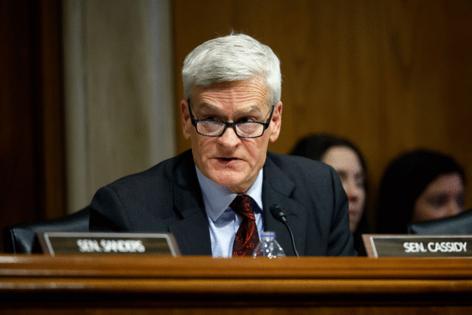Republicans brush aside Trump plan to slash NIH funding
Published in News & Features
WASHINGTON — House Republican appropriators plan to disregard the White House’s proposed 40% cut to the National Institutes of Health budget for fiscal 2026, according to multiple sources with knowledge of the situation.
Instead, the funding levels being discussed are similar to what’s currently appropriated, they said.
Republicans in the Senate are likely to follow suit, after multiple lawmakers in that chamber emphasized the importance of investing in medical research and expressed skepticism about the proposed cuts.
The White House in May proposed the agency receive $27.9 billion, about $18 billion lower than fiscal 2025 enacted levels, and laid out a plan for it to reorganize or combine several of its institutes.
The NIH has enjoyed year-over-year budget increases, until the COVID-19 pandemic put a harsh spotlight on the agency, with lawmakers objecting to its handling of gain-of-function research and allegations of sexual harassment. House and Senate Republicans alike have spent the last couple of years looking at plans to consolidate and reorganize the agency.
But even lawmakers leading those initiatives say a 40% cut is too much.
“If you want to control long-term health care costs, you’ve got to invest in basic research,” Senate Health, Education, Labor and Pensions Committee Chair Bill Cassidy, R-La., said.
“I would authorize more money,” he added. Cassidy is not on the Senate Appropriations Committee, but has spearheaded Senate efforts on reorganizing and modernizing the NIH.
That point of view is common among Senate Republicans. Katie Britt, R-Ala., a Senate appropriator and ally of the president who is also an advocate for Alabama research institutions, said ongoing research needs to be seen to fruition without cuts getting in the way.
“There’s always ways you can do things better and more efficiently and we support that, but we also want to support finding cures and getting those cures to the American people,” Britt said.
Appropriations member Sen. Shelley Moore Capito, R-W.Va., said the committee — which plans to mark up the Labor-HHS bill on Thursday — is working through the issues.
“Yeah, a 40% cut. I don’t think that’s what the Senate wants to do,” Capito said.
On the House side, Labor-HHS Appropriations Subcommittee Chair Robert B. Aderholt, R-Ala., says the panel wants to work with the administration as much it can, while at the same time preserving the functions of the NIH. Members of both parties feel strongly about their support for the NIH, he said, and deep cuts would likely not get through either chamber.
“Obviously, I think the goal is to try to get something that the administration is happy with, but at the same time, getting that past the House,” Aderholt said.
House appropriators met Wednesday evening to hash out spending level details and agreed not to cut funding levels to the level of the president’s budget request, according to the sources with knowledge of the discussions.
Impact of cuts
Even a more modest cut to NIH would lower the number of new drugs that come to market in the next three decades, according to the nonpartisan Congressional Budget Office.
Under a hypothetical scenario of a permanent 10% cut to preclinical research, or research conducted before clinical trials begin, 4.5% fewer new drugs would come to market. The impact would start small but grow over the 30-year period, CBO found, and take full effect in the third decade after the reduction begins. This would total roughly 30 drugs not coming to market over 30 years.
But the president’s requested 40% cut is so large that the CBO couldn’t predict the impact using its current models because such a budget reduction would be unprecedented.
NIH budget cuts could also lead to skilled workforce shortages, which would further slow research advancements and innovations, according to a recent JAMA study. These cuts, in turn, could have far-reaching implications beyond scientific progress and impact future health care costs.
Republicans are frustrated with the administration’s handling of already appropriated NIH funding, including canceled research grants and layoffs of employees who handled grants. A cohort on Thursday asked Office of Management and Budget Director Russell Vought to distribute all funds as Congress directed.
“Suspension of these appropriated funds — whether formally withheld or functionally delayed — could threaten Americans’ ability to access better treatments and limit our nation’s leadership in biomedical science. It also risks inadvertently severing ongoing NIH-funded research prior to actionable results,” the 13 Republican senators, led by Britt, wrote in their letter.
©2025 CQ-Roll Call, Inc., All Rights Reserved. Visit cqrollcall.com. Distributed by Tribune Content Agency, LLC.







Comments